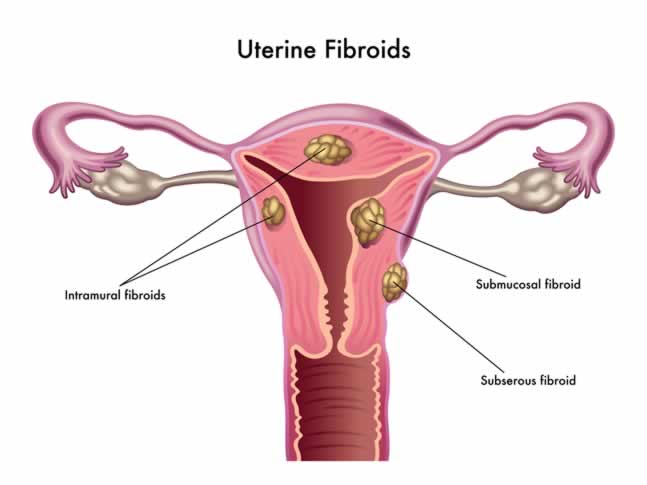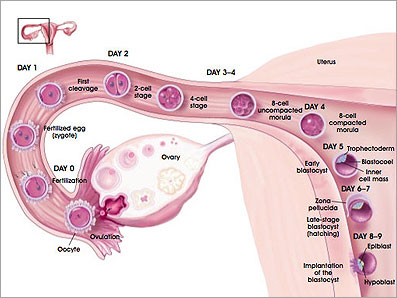Symptoms:
The main symptom of infertility is the inability to get pregnant. A menstrual cycle that’s too long (35 days or more), too short (less than 21 days), irregular or absent can mean that you’re not ovulating. There may be no other outward signs or symptoms.
When to see a doctor ?
When to seek help sometimes depends on your age:
- Up to age 35, most doctors recommend trying to get pregnant for at least a year before testing or treatment.
- If you’re between 35 and 40, discuss your concerns with your doctor after six months of trying.
- If you’re older than 40, your doctor may want to begin testing or
 treatment right away.
treatment right away.
Your doctor may also want to begin testing or treatment right away if you or your partner has known fertility problems, or if you have a history of irregular or painful periods, pelvic inflammatory disease,
repeated miscarriages, prior cancer treatment, or endometriosis.
Causes
-
Female reproductive system
-
Fertilization and implantation

Each of these factors is essential to become pregnant:
You need to ovulate.
- To get pregnant, your ovaries must produce and release an egg, a process known as ovulation. Your doctor can help evaluate your menstrual cycles and confirm ovulation.
- Your partner needs sperm.
- For most couples this isn’t a problem unless your partner has a history of illness or surgery. Your doctor can run some simple tests to evaluate the health of your partner’s sperm.
- You need to have regular intercourse. You need to have regular sexual intercourse during your fertile time. Your doctor can help you better understand when you’re most fertile.
- You need to have open fallopian tubes and a normal uterus. The egg and sperm meet in the fallopian tubes, and the embryo needs a healthy uterus in which to grow.
For pregnancy to occur, every step of the human reproduction process has to happen correctly. The steps in this process are:
- One of the two ovaries releases a mature egg.
- The egg is picked up by the fallopian tube.
- Sperm swim up the cervix, through the uterus and into the fallopian tube to reach the egg for fertilization.
- The fertilized egg travels down the fallopian tube to the uterus.
- The fertilized egg implants and grows in the uterus.
In women, a number of factors can disrupt this process at any step. Female infertility is caused by one or more of the factors below.
- Polycystic ovary syndrome (PCOS). PCOS causes a hormone imbalance, which affects ovulation. PCOS is associated with insulin resistance and obesity, abnormal hair growth on the face or body, and acne. It’s the most common cause of female infertility.
- Hypothalamic dysfunction. Two hormones produced by the pituitary gland are responsible for stimulating ovulation each month — (FSH) and luteinizing hormone (LH). Excess physical or emotional stress, a very high or very low body weight, or a recent substantial weight gain or loss can disrupt production of these hormones and affect ovulation. Irregular or absent periods are the most common signs.
- Premature ovarian failure. Also called primary ovarian insufficiency. This disorder is usually caused by an autoimmune response or by premature loss of eggs from your ovary (possibly from genetics or chemotherapy). The ovary no longer produces eggs, and it lowers estrogen production in women under the age of 40.
- Too much prolactin. The pituitary gland may cause excess production of prolactin (hyperprolactinemia), which reduces estrogen production and may cause infertility. Usually related to a pituitary gland problem, this can also be caused by medications you’re taking for another disease.
Damage to fallopian tubes (tubal infertility)
Damaged or blocked fallopian tubes keep sperm from getting to the egg or block the passage of the fertilized egg into the uterus. Causes of fallopian tube damage or blockage can include:
- Pelvic inflammatory disease; an infection of the uterus and fallopian tubes due to chlamydia, gonorrhea or other sexually transmitted infections.
- Previous surgery in the abdomen or pelvis. Including surgery for ectopic pregnancy in which a fertilized egg implants and develops in a fallopian tube instead of the uterus.
- Pelvic tuberculosis a major cause of tubal infertility worldwide although uncommon in the United States.
Endometriosis
Endometriosis occurs when tissue that normally grows in the uterus implants and grows in other locations. This extra tissue growth — and the surgical removal of it — can cause scarring, which may block fallopian tubes and keep an egg and sperm from uniting.
Endometriosis can also affect the lining of the uterus, disrupting implantation of the fertilized egg. The condition also seems to affect fertility in less-direct ways, such as damage to the sperm or egg.
Uterine or cervical causes
Several uterine or cervical causes can impact fertility by interfering with implantation or increasing the likelihood of a miscarriage:
- Benign polyps or tumors (fibroids or myomas) are common in the uterus. Some can block fallopian tubes or interfere with implantation, affecting fertility. However, many women who have fibroids or polyps do become pregnant.
- Endometriosis scarring or inflammation within the uterus can disrupt implantation.
- Uterine abnormalities present from birth, such as an abnormally shaped uterus, can cause problems becoming or remaining pregnant.
- Cervical stenosis, a narrowing of the cervix. It can be caused by an inherited malformation or damage to the cervix.
- Sometimes the cervix can’t produce the best type of mucus to allow the sperm to travel through the cervix into the uterus.
Unexplained infertility
Sometimes the cause of infertility is never found. A combination of several minor factors in both partners could cause unexplained fertility problems. Although it’s frustrating to get no specific answer, this problem may correct itself with time. But, you shouldn’t delay treatment for infertility.
Risk factors
Certain factors may put you at higher risk of infertility, including:
- Age. The quality and quantity of a woman’s eggs begin to decline with increasing age. In the mid-30s, the rate of follicle loss speeds, resulting in fewer and poorer quality eggs. This makes conception more difficult, and increases the risk of miscarriage.
- Smoking. Besides damaging your cervix and fallopian tubes, smoking increases your risk of miscarriage and ectopic pregnancy. It’s also thought to age your ovaries and deplete your eggs prematurely. Stop smoking before beginning fertility treatment.
- Weight. Being overweight or significantly underweight may affect normal ovulation. Getting to a healthy body mass index (BMI) may increase the frequency of ovulation and likelihood of pregnancy.
- Sexual history. Sexually transmitted infections such as chlamydia and gonorrhea can damage the fallopian tubes. Having unprotected intercourse with multiple partners. It increases your risk of a sexually transmitted infection that may cause fertility problems later.
- Alcohol. Stick to moderate alcohol consumption of no more than one alcoholic drink per day.
#women’s_Health #inftertility #Fertilization_and_implantations #Roots_MyHealthGain #www.rihl.in
awesome
Hi everyone, there is good news, a perfect and great one. My daughter Janet who has suffered of fibroid for 2 and half years has been cure by a Herbal doctor called Dr. buba who uses herbal and traditional medicine to cure people. I have spent so much on my daughter’s health paying hospital bills and getting her medications for years but no improvement. A friend told me about this herbal man who cure people with herbal medicine. he cures all sickness, diseases, viruses, and infections with his different herbal curing medicine.
The result that declares my daughter Janet healed was from a hospital here in Kansas, And the results of the test says my daughter was okay. Dr buba directed that Janet would be in 7days if she uses the medicine as directed. And 7days later, we went to confirm from the central hospital and several test that was done says my daughter is not sick of diseases . So she was cured by this herbal doctor in 7days as he has prescribe This amaze me though. I would advice everyone to meet this dr buba on dr.bubaspellhome@gmail.com for his herbal medicine to cure your illness because am happy to see my daughter healthy again.
Meet dr buba and set yourself and your love ones ill free.
you can also contact him for these same problems
EX BACK
HIV AND AIDS
PREGNANCY
HERPES
LOW SPERM COUNT ETC
doctor buba email again is dr.bubaspellhome@gmail.com or call +2348087937686
I am 40 years old and I have fibroids, 11 fibroids. No
kids yet, trying. I don’t have any pain but I bleed
extremely heavy. After suffering for about 5 years, I went
and had Acessa procedure done in March, 2016, now it is
2017. I am still bleeding exactly the same, heavy, and my
fibroids didn’t shrink. I am very stressed, if I knew I
should have not done it. I am not saying Acessa procedure
is bad, but it didn’t help me a bit.but i want to say a
big thanks to dr buba who helped me get cured i got his
mail from the internet as i was lookinf for blogs where
herbs can cure mei was not so sure about him but i
contacted him and gave my details to him and i did as he
asked me and today i am cured after i used his herbal drug
for just a week you should do same too contact for any sickness or ailment hiv aids herpes
dr.bubaspellhome@gmail.com or call +2348087937686 thanks
all
…………..
Comments are closed.